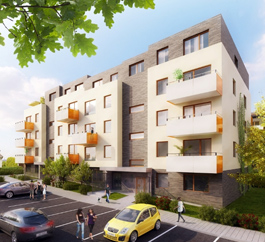
The first certified passive apartment building in the Czech Republic is in Modřany
 |
| Certification 'Certified Project' costs 12,900 CZK / housing unit + VAT |
"YIT Stavo is the first developer in the Czech Republic to decide to go through the certification of a passive residential building project. Previously, we had mainly received applications from owners of family homes and one administrative building," said Jan Bárta, the director of the Center for Passive House.
"To successfully pass certification, we had to meet all the mandatory parameters. In addition to these, other aspects were evaluated: for example, whether the building provides adequate protection against summer overheating and thermal stability, or whether the necessary air exchange and minimum supply air temperature are ensured," noted Vladimír Dvořák, managing partner and executive director of YIT Stavo.
However, the submitted project was not correct right from the start; the developer had to adjust it according to the comments from the Center for Passive House. They had to change, for example, thermal insulation, heating, shading, and ventilation, and they also had to fine-tune some other construction details.
According to the Center for Passive Housing, people living in passive apartments will primarily save on heating costs. "In the passive house F project KOTI Hyacint, owners of a 70 m² apartment will pay 2,783 crowns annually for heating. The average costs for heating such an apartment in a panel building from the 1980s amount to 27,400 crowns per year, while standard new constructions in category C are around 18,000 crowns," calculated Bárta's savings.
The Finnish group YIT entered the Czech market in 2008 by acquiring the Czech company Euro Stavokonsult. Since then, it has completed four projects in the Czech Republic, with three more under construction. In the future, the developer wants to penetrate the office and industrial real estate segments as well.
The English translation is powered by AI tool. Switch to Czech to view the original text source.
0 comments
add comment









